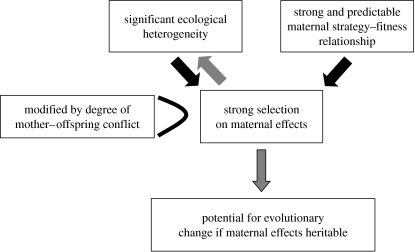Figure 1.
Summary of the ecological causes and evolutionary consequences of maternal effects considered. Maternal effects can be passive or active (Badyaev 2005). Passive effects are likely to be common in all animal systems; here we concentrate on active maternal strategies and effects which we believe are likely to be particularly important in cooperative systems. The two most important factors selecting for active maternal effects will be ecological heterogeneity and the strength and predictability of the relationship between maternal strategy and fitness. If there is no ecological heterogeneity or a weak and/or unpredictable relationship between maternal strategy and fitness, active maternal effects will not be expected. The strength and extent of maternal effects will be further modified by the dynamics of mother–offspring conflict. Greater selection on maternal effects might be expected where maternal strategies and offspring strategies do not converge and where offspring have considerable scope for counteracting a given maternal strategy. Strong maternal effects will in turn further influence ecological heterogeneity, leading to positive feedback between each, again modified by the dynamics of maternal-offspring conflict. Finally, while within-generation maternal effects can be strong without inheritance, ultimately evolutionary change will become more likely when maternal effects are inherited, either epigenetically or genetically.

